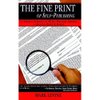Today, I picked up a letter sent to me in care of Mysteries To Die For, a bookstore in Thousand Oaks, California. The letter was from Airleaf Publishing, the vanity press company formerly known as Bookman Marketing, and they were offering to "sell MY GUN HAS BULLETS to a national audience!" for the low, low price of $3000.
I wrote about these parasites back in November… when this same "opportunity" to flush your money down a toilet cost a whopping $7000. Since then, it appears that they’ve become a shade less greedy but monumentally more stupid.
The incompetence represented by this letter is so extreme, I almost don’t know where to begin. Let’s start with them sending this pitch to a successful, published author who has castigated them publicly for their business practices before.
And where do these idiots send their letter? They send it to me in care of a bookstore that’s already selling my books.
The folks at Airleaf Publishing are obviously trolling the catalogs at iUniverse and other competing vanity presses,
figuring if the aspiring authors could be suckered once, they could be
suckered again.
But the dimwit who is doing the trolling apparently
doesn’t know when he’s picking books that are part of either Mystery Writers of America Presents or Authors
Guild’s Back-in-Print programs (both of which reprint
previously published books through iUniverse as a free service for their members).
The dimwit doesn’t realize that when he picks books from the MWA Presents or Back-In-Print authors, he’s
dealing with experienced professionals who haven’t paid to be published and who know
better than to be suckered by an insanely pricey vanity press come-on.
The Airleaf Publishing corporate policy must be to hire people who are "mentally challenged" or born with only a brain stem…and to hope whoever gets their letters are just as stupid and have high credit lines on their Visa cards.

